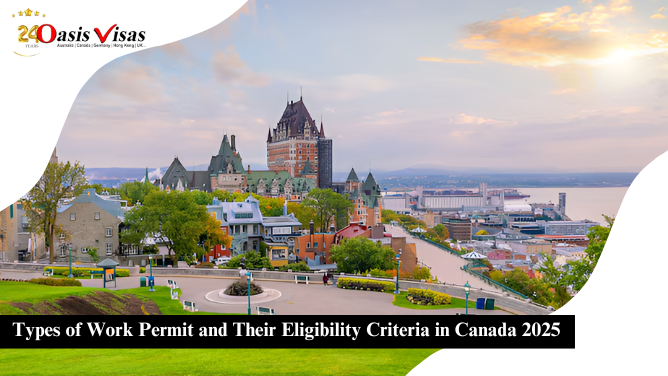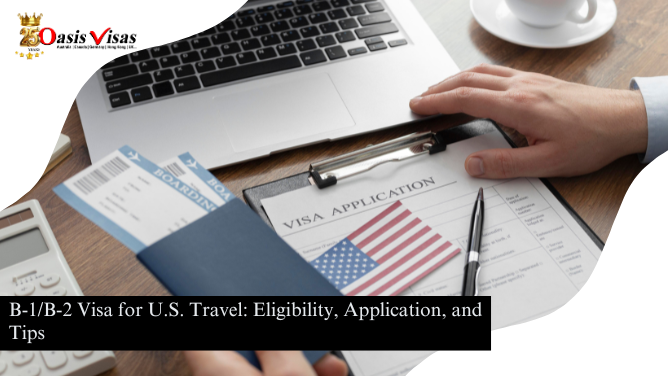
Many people and students wonder how many types of work permit Canada as an international destination to work hard for better career opportunities and a higher living standard. With its vast area, the government offers a gigantic source of job opportunities for the skilled professionals, laborers, or even students. To work in Canada, foreign nationals need to obtain a work permit, which forms a legal basis for doing so. There are various types of work permit in Canada with different conditions and requirements.
Though it may seem quite great to acquire a work permit at first, with the proper assistance, it becomes easier to handle. Whether it is for temporary work, permanent employment, or for specific reasons, the differentiation between the various types of work permit and their respective eligibility criteria must be well known. In 2025, though the rules of immigration might slightly change, the general work permit categories will remain approximately similar. Under, we’ll cover the different work permits available and highlight key information with respect to eligibility.
Types of Work Permit
Employer-Specific Work Permit
An Employer-Specific is one of the types of work permit, or also referred to as a closed work permit, allows you to work for a certain employer in Canada. The most common work permit does require a formal job offer from a Canadian employer. This means that for the employer to demonstrate that the foreign worker will not impact the Canadian labor market, an LMIA is required. Considering this, when you have a valid job offer and the LMIA is issued in your favor, then you can apply for this employer-specific work permit.
Eligibility Criteria for Employer-Specific Work Permit:
- You must have a job offer from a Canadian employer.
- Your employer has to obtain an LMIA, except if the job is exempt.
- You will need to demonstrate that you are eligible for the position offered
- You will intend to leave Canada at the end of your work permit.
Open Work Permit
While the Employer-Specific Work Permit binds you to a specific employer in Canada, an Open Work Permit gives you the freedom to work for any employer in Canada. It’s more flexible since it doesn’t tie you down to one employer. The open work permit is usually granted to someone who is already in Canada, such as a spouse of a skilled worker, international student, and so on.
Eligibility Criteria for Open Work Permit:
- You need to be the spouse or common-law partner of an economic immigrant or international student.
- You might be eligible if you are an international student who graduated from a recognized Canadian post-secondary institution.
- You might be eligible if you have a temporary resident permit.
- You have to not be convicted of a crime.
Post-Graduation Work Permit (PGWP)
The Post-Graduation Work Permit is available to international students who have finished their studies at a designated Canadian institution for up to three years of work in Canada. This is an excellent way to acquire valuable work experience in Canada which can also complement the application process for permanent residency in the future.
Eligibility Criteria for Post-Graduation Work Permit:
- You must have completed a program of study at a Designated Learning Institution (DLI) in Canada.
- The program must be at least eight months long.
- You must apply for the PGWP within 180 days of receiving your final transcript.
- You must not have previously been issued a PGWP for studies in Canada.
International Mobility Program (IMP) Work Permit
The IMP allows foreign workers not to require an LMIA for a work permit application. In other words, intracompany transferees, business visitors, or participants of international agreements can be qualified for the IMP work permit.
Eligibility Requirements for an IMP Work Permit:
- The applicant must enter Canada under some international agreement between Canada and another country, such as NAFTA or CETA.
- You have to comply with the conditions prescribed in the contract.
- You must be able to prove that you will leave Canada once the work permit expires.
Temporary Foreign Worker Program (TFWP)
By the Temporary Foreign Worker Program, Canada’s employers are allowed to bring foreign workers into their organizations to minimize labor shortages. This is a more regulated program, and employers need to prove that no Canadian worker is available to do the job. This often entails an LMIA where they could use it to evaluate the potential impact of hiring a foreign worker to the Canadian labor market.
Eligibility Requirements for TFWP:
- You are required to have an employer in Canada who can offer you a job.
- The employer must be issued a positive LMIA prior to applying for a work permit.
- You must possess qualifications and experience in the kind of job that you seek in the job.
- You must meet specific requirements for stipulations as may be set by the Canadian government.
Intra-Company Transfer Work Permit
An Intra-Company Transfer Work Permit is granted to the multinational companies so that they can transfer their employees to Canada. It is a very good option for such employees of an international business seeking temporary employment in a Canadian branch. This types of work permit has a relatively streamlined application process.
Eligibility Criteria for Intra-Company Transfer Work Permit:
- You must be an employee of a multinational company for at least one year.
- You transfer to a managerial, executive or specialized knowledge position in Canada.
- You have worked for the same employer in the same capacity for at least one year prior to your transfer.
Spousal Open Work Permit
A Spousal Open Work Permit enables the spouse or common-law partner of a skilled worker or international student to work in Canada. It is pretty popular when one spouse is already working or studying in Canada.
Eligibility Criteria for Spousal Open Work Permit:
- You must be the spouse or common-law partner of a temporary foreign worker or an international student;
- You must demonstrate your relationship.
- You should not have a past criminal record.
Bridging Open Work Permit (BOWP)
The Bridging Open Work Permit (BOWP) is for those individuals who enter Canada on a work permit but had submitted an application for permanent residence beforehand. You are allowed to stay working throughout your period of waiting for the actual attainment of permanent resident status.
Eligibility Criteria for Bridging Open Work Permit:
- You are required to have filed an application for permanent residency under a prevailing category.
- You need to have an approved work permit at the time of applying.
- You need to be awaiting a decision on an application for permanent residence.
Work Permit for Young Professionals
Young Professionals Work Permits allow people under 35 years old to immigrate to Canada and get professional work experience. The permit comes under the IEC. In this scheme, work permits for young people are processed from eligible countries.
Eligibility Requirements of Young Professionals Work Permit:
- You should be between 18 and 35 years.
- You should be offered a valid job through a Canadian employer.
- Your educational background or career goals should be about the nature of your work.
Religious Worker Work Permit
The Religious Worker is one of the types of work permit that allows religious leaders, missionaries, or workers to travel to Canada in order to engage in work in religious organizations or institutions.
Eligibility criteria for a religious worker work permit include:
- You must be employed by a recognized religious organization
- Your employment must involve religious activities and is necessary for the operation of the religious organization.
- You will prove that your employment does not jeopardize the job market in Canada
There is a clear understanding of the types of work permit there is to offer in Canada and what one needs to qualify for them. Whether you want to be there for a short period or you need a second step in getting permanent residency in Canada, there is an option for every foreign worker in Canada. Also, different procedures and conditions of different types of work permits apply, so you need to figure out which one suits your needs. Do not forget to follow the news concerning immigration policies as 2025 draws near.









